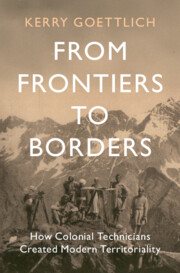
-
Select format
-
- Publisher:
- Cambridge University Press
- Publication date:
- October 2025
- November 2025
- ISBN:
- 9781009553018
- 9781009553001
- 9781009552998
- Dimensions:
- (229 x 152 mm)
- Weight & Pages:
- 0.57kg, 282 Pages
- Dimensions:
- (229 x 152 mm)
- Weight & Pages:
- 0.412kg, 282 Pages
Book description
How did modern territoriality emerge and what are its consequences? This book examines these key questions with a unique global perspective. Kerry Goettlich argues that linear boundaries are products of particular colonial encounters, rather than being essentially an intra-European practice artificially imposed on colonized regions. He reconceptualizes modern territoriality as a phenomenon separate from sovereignty and the state, based on expert practices of delimitation and demarcation. Its history stems from the social production of expertise oriented towards these practices. Employing both primary and secondary sources, From Frontiers to Borders examines how this expertise emerged in settler colonies in North America and in British India – cases which illuminate a range of different types of colonial rule and influence. It also explores some of the consequences of the globalization of modern territoriality, exposing the colonial origins of Boundary Studies, and the impact of boundary experts on the Paris Peace Conference of 1919–20.
Reviews
‘In this rich and thought-provoking book, Kerry Goettlich traces the genealogy of linear borders between states back to the colonial origins of the practices of territorial delimitation and demarcation and their problematic legacies in international politics. Shifting the focus away from territoriality as but an aspect of state sovereignty, Goettlich provides a fresh and innovative take on an issue that has haunted the study of international relations for decades.'
Jens Bartelson - Professor of Political Science, Lund University
‘From Frontiers to Borders turns conventional wisdom on its head. Contrary to the perspective that the concept of modern territoriality emanated from Europe, Kerry Goettlich shows how technical, cartographic practices in the colonies influenced spatial imagination in the imperial metropoles. In so doing he exposes the artificiality of territorial claims in general. Anyone interested in how we think about territory and borders should read this insightful book.'
Hendrik Spruyt - Professor Emeritus of Political Science and Norman Dwight Harris Chair Emeritus in International Relations, Northwestern University
Contents
Metrics
Altmetric attention score
Full text views
Full text views help Loading metrics...
Loading metrics...
* Views captured on Cambridge Core between #date#. This data will be updated every 24 hours.
Usage data cannot currently be displayed.
Accessibility standard: Missing or limited accessibility features
Why this information is here
This section outlines the accessibility features of this content - including support for screen readers, full keyboard navigation and high-contrast display options. This may not be relevant for you.
Accessibility Information
The PDF of this book is known to have missing or limited accessibility features. We may be reviewing its accessibility for future improvement, but final compliance is not yet assured and may be subject to legal exceptions. If you have any questions, please contact accessibility@cambridge.org.
Content Navigation
Table of contents navigation
Allows you to navigate directly to chapters, sections, or non‐text items through a linked table of contents, reducing the need for extensive scrolling.
Index navigation
Provides an interactive index, letting you go straight to where a term or subject appears in the text without manual searching.
Reading Order and Textual Equivalents
Single logical reading order
You will encounter all content (including footnotes, captions, etc.) in a clear, sequential flow, making it easier to follow with assistive tools like screen readers.
Structural and Technical Features
ARIA roles provided
You gain clarity from ARIA (Accessible Rich Internet Applications) roles and attributes, as they help assistive technologies interpret how each part of the content functions.

